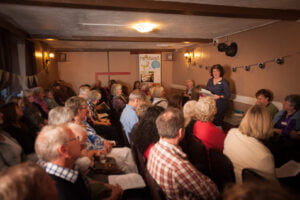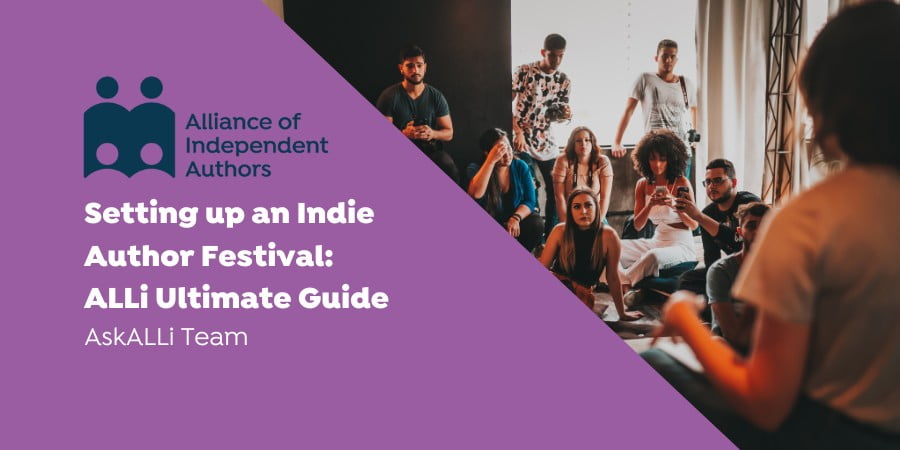 As the independent author community continues to gain momentum, the need for new platforms to showcase our work becomes increasingly important. Enter the indie author festival – a celebration of literature, creativity, and the diversity of stories being told by indie authors. From the initial spark of inspiration to the logistics of event planning, this ALLi post explores the steps involved in creating a space where self-published authors can connect with readers, fellow writers, and the literary community at large.
As the independent author community continues to gain momentum, the need for new platforms to showcase our work becomes increasingly important. Enter the indie author festival – a celebration of literature, creativity, and the diversity of stories being told by indie authors. From the initial spark of inspiration to the logistics of event planning, this ALLi post explores the steps involved in creating a space where self-published authors can connect with readers, fellow writers, and the literary community at large.
But this isn't just a theoretical guide – we've reached out to three of our ALLi Ambassadors who have successfully organized their own festivals. Their first-hand experience shares the challenges they’ve faced, the lessons they’ve learned, and the successes that made it all worthwhile. So, whether you're a seasoned event organizer, or just starting to think about the possibilities of running your own festival, this post aims to demystify the process so you can turn your vision into a reality.

Debbie Young, ALLi Ambassador
How to Set Up and Run an Indie Author Festival, with Debbie Young
Why don’t mainstream festivals book more indie authors?
ALLi has long campaigned for the inclusion of indie authors in mainstream literature festivals. While the boundary between traditionally published and indie authors continues to blur, with some events now adding a ‘locally grown’ element to their programmes which are open to the indies on their patch, big commercial festivals still favour household name authors and big publishing houses.
Why is this? Firstly, because pitching their latest bestsellers to litfests is a key part of traditional publishers’ marketing programmes. That’s why you see the same big names popping up at multiple festivals each year with their new book.
Equally significant is the financial factor. The major festivals run year-round admin and marketing campaigns with hordes of permanent staff. They hire large, expensive venues such as theatres and town halls. They run complex websites and print and distribute lavish brochures in vast quantities. They must book big name authors to fill the venues and thereby cover their high costs. Even then, they usually need major sponsors, as they cannot break even on ticket sales alone.
The good news is that you do not have to wait to become a best seller or to snag a traditional contract to appear at a festival. There is a huge appetite among readers for affordable, interesting, author-led events in their neighbourhoods. If you can offer affordable prices in a comfortable and convenient venue with easy access and parking nearby, they won’t mind that the authors aren’t famous names, especially if some of them are local. As Tammi Lebrecque, author of Newsletter Ninja, says, readers think “all authors are rock stars!”
Think local
Your local library or bookshop may offer you free use of their venue, in return for you bringing eager readers flocking to their premises. I specify local because it’s always going to be easier to run an event on familiar home turf, where you may already have useful contacts and knowledge, including friends, to help you in advance and on the day.
Parochial events also generate a sense of pride, ownership, and curiosity. I named my event, which I founded in 2015, after my home village in the Cotswolds: the Hawkesbury Upton Literature Festival, or HULF for short – www.hulitfest.com. I knew HULF had really arrived when I stopped in our high street to read a new tourist information board erected by the Cotswold Way Association and, to my surprise, saw they’d listed HULF as part of our community identity and a top visitor attraction.

ALLi News Editor, Dan Holloway, speaking at HULF
Your festival – your rules
Don’t try to replicate the big litfests on a smaller scale. Instead, focus on your own priorities and preferences. For example, you don’t need to give every speaker an hour or so to talk about their latest book. To showcase as many indie authors as possible at each event, I give each a relatively short slot, e.g. fifteen minutes. This makes every HULF quick-fire, good fun, and great value for the audience. After one HULF event, ALLi’s News Editor, Dan Holloway, director of HULF’s poetry strand, remarked to me: “It’s amazing what can be achieved when you break the rules.”
The joy of networking
Another advantage indie events can offer is greater access to authors. Don’t tuck your speakers away in a Green Room, but encourage them to mix with the audience between events. In an era when so much is online, face-to-face events are special. One YA author told me it was worth coming for the conversation she’d had with local teens to gain first-hand feedback from her target audience.
Financial matters
When planning your event’s finances, be realistic and cautious. List all your costs in advance and add a contingency. My biggest cost each year is event insurance. Seek sponsorship to help keep ticket prices down. This needn’t be a single big-name sponsor. Donations of home-made cakes to sell or from local retailers can make a big dent in your costs.
What should you pay speakers? Should you pay them at all? I don’t, and here’s why… I created my event as a volunteering opportunity, I have put in hundreds of hours of the years, but I don’t take any money out of it myself, and I underwrite any losses personally.
My prime motivation was to make the event affordable to all, including those who couldn’t afford to attend the big trade litfests. If I paid speaker fees, as my current venue has a maximum capacity of 60, ticket prices would be unfeasibly high. In the early days, admission was free, and costs were covered by donations, grants, and sales from refreshments. Currently, admission for a three-hour, multi-author event is just £5, which includes refreshments and a £2 book token.
Is it unethical to ask authors to speak for free? I sought advice from Nicola Solomon, CEO of The Society of Authors, and she advised me that for a non-profit event, it’s perfectly acceptable. Only when litfests are run as a commercial venture is it wrong not to pay the speakers. (Even speakers at the major events generally get paid very little.)

Speaker at Hawkesbury Upton World Book Night Festival. Image c. Clint Randall
The three Ps
This approach meshes with Solomon’s classic marketing advice to authors: whatever marketing you do, make sure it satisfies at least one of the three Ps – profit, pleasure, or profile. HULF gives speakers pleasure and profile in abundance, as well as confidence and experience that equips them to speak at other events, or to set up their own litfest on their home turf. HULF events also provide authors with a free book stall, from which they may keep 100% of their revenue.
Start small
Judging by my own eight year's of experience, I advise that if you’re planning to found a local indie litfest, start small and scale up. An event with a small seating capacity in an intimate venue can be just as enjoyable to author and audience as one of ten times that number in the town hall, not least because it allows more interaction between speakers and audience. An attendee at one of my events said as he left a talk in a small chapel: “You’d never get this at Cheltenham Literature Festival” (the biggest and oldest litfest in England). He was right – there’s little audience participation at the big shows. These days, you may not even be invited to queue to get a book signed by the speaker – books are sold pre-signed.
Be open-minded
If you set up your event specifically to be open to indies, don’t rule out allowing traditionally-published authors in too. For PR value, I invited one household name to launch the first ever HULF – bestselling romantic novelist Katie Fforde, then President of the Romantic Novelists’ Association. HULF’s reputation is such that many other traditionally-published authors have asked to take part too. Provided they can add value and relevance to the event, I’m happy to include them. And that’s exactly how it should be.
Learn from experience
Evolve your event from year to year. Learn from your successes and mistakes. Poll audiences and authors after each festival. My first HULF was just a few hours in a pub on a weeknight, before growing into an all-day jamboree on a Saturday, with about 60 authors in five venues with five parallel strands of talks, debates, workshops, and readings.
Should you take it online for wider reach? That’s up to you, but I don’t do that for HULF, for two reasons. Firstly, I don’t want to cannibalise in-person attendance. Secondly, part of the charm of HULF is what goes on between the talks. An online event would exclude the enjoyable in-person networking opportunities with fellow authors and readers, and the sale of signed books at the book stalls. Don’t let yourself be pushed into making changes you don’t want.

Authors at Hawkesbury Upton World Book Night Festival. Image c. Clint Randall
You do you
Instead, stay focused on YOUR objectives. But prepare for the unexpected, both opportunities and obstacles. In the first few years, HULF grew beyond my wildest expectations, in size and profile. For example, a couple of Australian visitors had planned their European trip around it, and an author resident in France made a special trip at her own expense to be a guest speaker.
Covid forced me to suspend festival events for a couple of years, but it also gave me the opportunity to rethink and restructure. I now hold smaller events but more frequently, focusing on serving my local community of readers and writers, which was HULF’s founding reason. It’s still a lot of work and a source of stress, but the excitement on the day and the satisfaction at the close is ample reward.
10 top tips for running a successful indie author festival
- Tailor the programme: to suit your target audience, rather than allowing authors simply to promote their books. I set a specific theme for each event these days, e.g. Travel and Adventure or The World at War, to maintain interest and variety.
- Never book an author without first reading one of their books and meeting them online or in person, for quality assurance.
- If you are planning a regular event, fix on the same date to encourage people to put it in their diary far in advance, e.g. the last Saturday in April.
- Encourage visitors to buy books by including a book discount voucher with every ticket. This is all the most important if you’re not paying speaker fees. Then reimburse the authors for each voucher they accept in part-payment.
- Include at least a couple of local authors to encourage a sense of ownership and pride from your neighbourhood audience.
- Create branded images and links to encourage your authors to promote your event in advance.
- Sell tickets in advance via an online service such as Eventbrite – you’ll sleep easier in the run-up knowing you will have an audience, rather than waiting to see who turns up on the day. And if any advance buyers don’t turn up, at least you have their payment. (For one sell-out event, I resold tickets from no-shows, thus technically selling more tickets than there were seats!)
- Use a PA system, no matter how small your venue. Most authors don’t project enough to be heard without a microphone.
- Be strict about timing. Tell speakers their allocated time slot in advance and don’t allow anyone to overrun. Readings should be no more than three minutes long. (For more on the importance of keeping readings short, take a look at this ALLi post from Dan Holloway: Why Less is More…)
- Allow sufficient comfort breaks, especially if serving drinks!
Debbie Young is the author of thirteen novels, four collections of short stories, a novella, three novelettes and of author advice guidebooks for ALLi. Originally self-published, her novels are now published by Boldwood Books, but she continues to self-publish short fiction and non-fiction. She is the founder and director of the Hawkesbury Upton Literature Festival (HULF), a course tutor for Jericho Writers, and a frequent speaker at events for writers and readers. A passionate advocate for indie authors, she is a UK Ambassador for ALLi and former editor of ALLi’s Self-publishing Advice blog.

Rhiannon D. Elton
Building a Community to Launching a Festival, with Rhiannon D. Elton
From the moment I first held a pen, I dreamt of becoming a fiction author. Life, in its peculiar way, confirmed my calling. As I embarked on this journey, I sought fellow travellers in Logan, my city, who shared my passion for storytelling. Logan was a place teeming with hidden gems—exciting events and vibrant communities—yet it suffered from a unique problem: the world knew little about them. The most exhilarating gatherings went unnoticed, a curse that haunted the organizers.
This secrecy extended to the diverse communities within our city, including our literary haven. It was akin to being part of a secret society that didn't desire secrecy. Even those in my immediate circles had ties to the publishing world, a revelation that took me over five years to uncover.
But every community has to start somewhere, and I had no intention of being the sole author in Logan. My quest led me to fellow fiction authors who, like me, were oblivious to one another's existence. I reached out to our local library and initiated “Writing Fridays,” a weekly gathering that has thrived for nearly four years.

Logan Chamber of Commerce logo
The importance of local partnerships
I also forged a partnership with the local Chamber of Commerce, recognizing that many authors I met were artists, not marketing or business experts. Bridging the gap between creativity and commerce, I aimed to ensure everyone's success.
These ambitions remained undaunted as I worked to unite disparate writing groups. As an extrovert, I craved the camaraderie and inspiration that came from sharing ideas, learning from others, and offering assistance. My dream was to sustain myself through my writing, and this endeavour seemed like the ideal path.
Then came the crown jewel of our literary calendar—the Logan Writers Festival.
How the festival began…
I began by researching previous iterations of the festival to gain insights into its history and ensure I wasn't encroaching on anyone's territory. The remnants of past festivals dated back over a decade, with a prominent blog post declaring that its organizer would never repeat the endeavour. With that assurance, I set out to bring the dream to life.
I scoured for the perfect venue, started social media platforms, launched a website, and leveraged the non-profit status of the Logan Chamber of Commerce to open doors that a for-profit venture could never have budged.
The festival came to life through the dedication of volunteers. While their personalities sometimes clashed and priorities shifted, their unwavering passion propelled us forward. It was evident that only a select few possessed the unique blend of skills and dedication required to manage and oversee every facet of such an event.
Throughout this journey, I continually asked myself, “What would I desire if they invited me to speak at this festival?” I yearned for an event that was not only entertaining but educational. I wished for authors to thrive, readers to feel a sense of belonging, and the city to recognize authors as invaluable contributors to culture and community.
Making the vision a reality
Year by year, step by step, this vision materialized:
- The introduction of the Logan Laureate Award, steadily gaining popularity each year.
- A line up of twenty speakers annually, discussing all things related to writing.
- A bustling marketplace with seventy available stalls.
- An online community of nearly 1,500 members, alongside an email list of 4,000 subscribers.
- Major publishing houses, including Penguin, expressing interest in having their authors participate in our festival.
- An audience of 500 attendees at our 2023 festival, with exponential growth projected each year.
- Authors, book clubs, agents, editors, and publishers now approaching us to become part of our festival, eliminating the need for us to seek them out.

Photo by Alexandra Fuller on Unsplash
Six considerations before launching a festival
The journey is far from over, but if I could offer advice to aspiring authors eager to launch their own festivals, I'd share the following:
- Develop a comprehensive marketing strategy, encompassing social media, video, posters, café flyers, and local advertisements. Prioritize attracting attendees to your festival.
- Cultivate and segment an email list, categorizing subscribers as readers, writers, volunteers, or sponsors. Regularly communicate with them, for they will be your support network in the years to come.
- Explore local government grants for community events to secure vital financial support.
- Consider hosting your event indoors. While outdoor venues may seem appealing, an indoor setting removes the challenges of seeking marquee sponsors and the setup and dismantling of stalls.
- Seek financial sponsors, and in-kind supporters, offering them reasonable incentives. Sponsors are the lifeblood of a fledgling festival. These may include interviews on your platform, regular social media acknowledgments, free tickets, promotional stall space, and exclusive networking events.
- From early on, ensure a clear succession plan is in place to prevent the festival from fading if you ever experience burnout. Maintain detailed records of operations, contacts, and processes that any successor can pick up and continue.
A festival and a community are like plants; they grow gradually. Your first event may attract only a handful of attendees, but with continuous learning, growth, and a dedication to serving your community, you will nurture something truly remarkable.
By establishing a literary community, you're making a profound difference in the lives of your fellow citizens. You're fostering a love for the written word and illustrating that there are countless paths to realizing dreams.
Rhiannon D Elton weaves tales of mystery and magic as the fantasy detective author of the Wolflock Cases series. Her love for all things fantastical began as a young girl, raised by a fairy and tutored by wizards, where she discovered the power of imagination and the art of storytelling. Beyond the page, Rhiannon is a tireless champion of the arts and a beacon of inspiration for aspiring writers. She is the progenitor and organiser of the Logan Writers Festival, bringing together communities of writers, artists, and creatives from all walks of life.

Ian Hooper, Founder ‘Indie Author Book Fair'
Establishing the “Indie Author Book Fair” with Ian Hooper
Ah, how I dream of going to Cheltenham and being feted as an author. I mean, I’ve been to Cheltenham many times… mainly to lose money on the horse races, but that’s a different blog for another time.
The author me wants to go to the Cheltenham Literature Festival as an invited guest speaker but, like Hay and so many others, it seems to be the almost exclusive domain of “Traditionally Published” authors.
Occasionally, as an independent author, you can be lucky enough to get invited to a festival or two, but it isn’t a regular occurrence. And so, in mid-2022, I thought that if “us indies” couldn’t join them we’d hold our own. I decided to organise the inaugural “Indie Author Book Festival”.
My top tip: run a test event
Thankfully, I had a colleague who persuaded me it would be a much saner idea to start small and build towards it. They were correct.
But first, this is important to note… There are oodles of “indie author events” designed for indie authors which look in depth at the whole concept of “Being Indie”. These events are attended by indie authors (in droves). They are well-formed and ongoing. This idea is not a reinvention of that. This event is for indie authors to showcase their books to readers. Of course, that begged the question: would any readers turn up?
To test the idea, we held test events, one in Cambridgeshire (Apr 2023) and two in Western Australia (May and December 2023). Based on all the feedback, they were rip-roaring successes. Spurred on, we arranged the next two fairs: 14th January, Victoria, Australia and 4th May 2024 in Cambridgeshire, UK. Both went “live” a little while ago and both are sold out for author spaces.
The “Indie Author Book Fair” event program is growing
The next step for us was to offer authors the chance to host your own fair under our “umbrella”. We have the website, the author registration mechanism, the branding, and supporting information. In short, we have the method and the means, if you have the venue and the enthusiasm. Given that we want the fairs to be run by bona fide indie authors, the criteria is that a host must be a current member of the Alliance of Independent Authors, and a published indie author, although please note the events are not directly endorsed by ALLi. There is a small administration fee, and a fair must not clash with others being held. You can learn more here: Indie Author Book Fair, and here: Apply to Host an Indie Author Book Fair.
Ian Hooper, (and his penname of Ian Andrew) is the author of a series of award-winning crime novels, an occasional dabbler in other genres and a successful ghost writer. Passionate about the Independent Author movement, he established The Book Reality Experience in 2015 to assist would-be indies and is currently planning the inaugural Indie Author Book Festival for September 2024. Originally from Northern Ireland, Ian ‘retired' to Western Australia after 20 years in the Royal Air Force. He is a Fellow of the Australian Institute of Management and holds a master's in creative writing from the University of Hull.

Photo by Gabrielle Henderson on Unsplash
Write for ALLi
Thank you to all three of our ALLi Ambassadors for sharing their experiences of organising indie author festivals.
To contribute your experience to the ALLi Blog, we are now taking blog proposals for posts from March 2024 onwards. You can visit our full guidelines on writing for us, here: Writing for ALLi.





